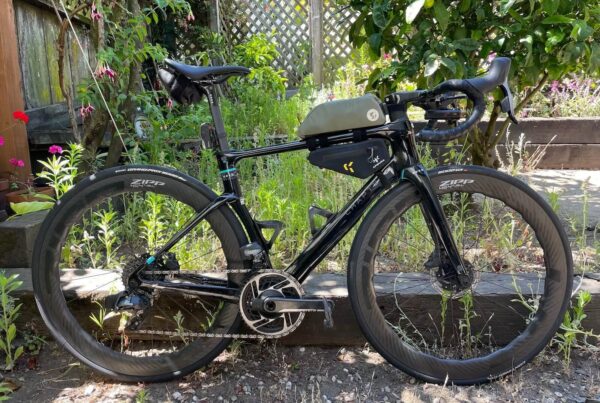I Was In A Collision—What Should I Do?
By Bob Mionske
You’ve just been hit by a car, and you’re lying on the roadway. In Part 1 of this article, I advised you to begin documenting what happened. But what if you’re injured and unable to function? Here’s what you need to know:
- A good forensic engineer can reconstruct the accident.
- Police reports and investigations are not the last word or even the best word on what happened.
- If you think that the police got it wrong, you can make an effort to get the accident reportamended, and through your attorney, have your own forensic engineer reconstruct the accident.
- If you have a GPS device or GPS on your cell phone, it will track your ride, and the data can be retrieved later to assist in accident reconstruction.
Medical Care: Do You Need It, Or Can You Just Tough It Out?
If you have been seriously injured, you will be transported to a hospital for emergency medical treatment. This is why you need to carry your medical insurance card, and an ID with an emergency contact number. But suppose you only have minor injuries? Or even no injuries? Here’s what you need to know:
- Don’t assume that your injuries are minor. Cyclists are used to toughing out pain, and the true extent of your injuries may be masked until the adrenaline wears off.
- Don’t assume that you haven’t been injured. Some injuries don’t surface until much later.
- Have a doctor examine you as soon as possible and report any symptoms, no matter how trivial, or even if you don’t think you’ve been injured.
- If you do not receive an examination or medical care, you will have no proof that you were injured in this collision, and you will not be offered any compensation later for your injuries.
- Depending on the extent of your injuries, your medical treatment may continue after your hospital stay has ended. There may be follow-up doctor appointments, surgery, physical therapy, medications, and other medical treatment essential to your recovery.
If you cannot work due to your injuries, you must obtain a note from your doctor stating that you cannot work. Additionally, you must record all of your lost wages during the period that you cannot work. The doctor’s note and your record of lost wages will be essential evidence to support a claim for lost wages with the driver’s insurance company.
Legal Pitfalls
You should wait until you are fully recovered or until your recovery progress has reached a plateau before you negotiate a settlement for your damages. You don’t want to negotiate the amount of your settlement before you know what the full damages will be. If you don’t wait, the insurer will know that you are rushing the process, and they will discount the value of your claim. However, there are some legal pitfalls you need to be aware of:
- You have a deadline (called a “Statute of Limitations”) for filing a lawsuit that you absolutely cannot miss. If you do miss that deadline, you will lose your legal right to compensation for your injuries.
- Every state has its own Statute of Limitations, so you must be aware of the time limits in the state where you were injured.
- It takes time to file a lawsuit, so do not wait until the last minute before consulting an attorney.
- Most cases are settled outside of court, but unless there is a possibility that you might file a lawsuit, the insurance company has no incentive to negotiate a settlement with you. So even if you don’t want to sue, you must still know when the clock is about to run out.
The bottom line is this: If you miss your deadline for filing a lawsuit, your legal rights will expire, there will be no settlement, and you will receive zero for your injuries. There are some other legal pitfalls you need to know about:
- After you file a claim with the insurance company, you will be asked to make a recorded (or sometimes written) statement about what happened. These statements are admissible as evidence and can be used against you at trial. I advise my clients not to provide one.
- If you are not represented by an attorney, you will probably be required to provide a recorded statement. If you refuse, the insurer will be unwilling to negotiate a settlement.
- Everything that you say in the recorded statement can be used against you to limit or even deny you compensation for your injuries, so before you make a recorded statement, or even discuss the collision with the insurance company, consult with an attorney.
Property Damage: Who’s Going To Pay For Your Broken Bike?
In addition to your physical injuries, you will likely have damage to your bike and accessories, and the driver’s insurance should pay for these damages as well. When you are able, you will want to begin documenting your property damage. Here’s what you need to know:
- Get a signed estimate for bike repair or replacement on letterhead from the bike shop where you purchased the bike.
- If your bike has a carbon fiber frameset and was involved in a collision with a car, it is toast and needs to be replaced, even if you can’t see any damage.
- If the bike shop is making an estimate for replacement, it should be for the same model. If that is no longer available, it should be for a comparable model. Include an estimate for any accessories that were damaged, including your helmet, gloves, glasses, computer, lights, and other items.
- Do not tamper with the bike in any way, and do not have the bike shop make any repairs. Leave your bike and other damaged property in the same state it was in after the accident. Take photos of all your damaged equipment and accessories.
You will not be offered full replacement value for your bike; instead, the insurer will deduct for depreciation. Once you have reached an agreement on what your damaged property is worth, you can settle the property damage part of your case. Before you sign, make sure that it only releases the insurer from further liability for property damage.
Document Everything
If you want to be fairly compensated for your injuries and other losses, you must document everything, including medical care, time off of work, and property damage.
- Take photos of your injuries and damaged property.
- Save all of your bills, receipts, pay data, and repair estimates.
- Preserve your damaged property as evidence.
- Keep a written record of any impacts that the collision has had on you: missed work, pain, changes in your lifestyle, and any other effects on your life.
- Record what you remember about the collision, road and weather conditions, and anything the driver said to the best of your ability. If you were using GPS, save your data.
- The accident scene should be investigated for evidence about how the accident occurred, including obtaining skid-mark measurements, photographing the accident scene, taking measurements and making diagrams, and speaking with witnesses. Typically, when you hire an attorney, the attorney will conduct this investigation for you.
And that raises the question—should you hire an attorney, or should you handle your claim yourself? The answer to that question will depend upon the specifics of your case, which I will discuss in the next and final part of this article.
For more information about bicycle accidents and insurance, see my book Bicycling & the Law.
Research and assistance by Rick Bernardi, J.D.
Connect with Bob on Facebook!
This article, How to Handle Bike-Car Accidents, Part 2, was originally published on Bicycling on June 30, 2011.



